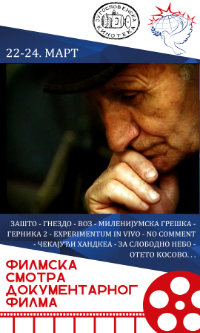IT IS PRINCIPLES THAT PROTECT INTERESTS, NOT THE OTHER WAY AROUND
| Activities - Comments |

Živadin Jovanović
What we read and listen is that Serbia in the matter of important issues, will position herself in line with her interests. Thus, heeding the criterion of own interests, Serbia will set her stance vis-à-vis the West’s campaigning to make Kosovo a member of various international organizations, vis-à-vis the Western pressures to introduce sanctions against Russia, as well as in terms of the Scholz-Macron plan. No matter how logical this approach seems to be, such a criterion leaves ample room for different interpretations in respect of what, under various circumstances, might be construed as the interest of Serbia. This view draws on the fact that any discussion about the existential state and national matters -- also including the future of Kosovo and Metohija -- is regularly and extensively shadowed by talks of a high degree of Serbia’s economic and financial dependence on the West (i.e., investments, trade, donations, ‘benefits’, shared values, etc.). It is in principle unacceptable that the matter of sovereignty and territorial integrity as the crucial issues in terms of the durable survival of the state and the nation, get to be treated on par with economic, financial or EU membership issues, since all the latter are incomparably less important and also subject to swift changes. No matter how thirsty we may be for investments, a more rapid development and a better life, it is far from recommended to turn greedy and to hastily rely on any or rather anyone’s promises, and in the least on cajoling and sugar coated promises of those who have already and so many times in the past played dirty tricks on us. We must simply bear in mind that those values are not comparable, and let this thought guide us in any given situation.
We must also take into account that, throughout history of Europe, some other imposed solution used to be heralded as ‘peace saving’ while in the real life paving the way for a global disaster. It must not be taken for granted that the present-day seizure of Kosovo and Metohija is any less relevant for peace and security in Europe than it was the case of the German seizure of the Sudetenland from Czechoslovakia back in 1938, endorsed by France, the UK and Italy. It is worth recalling this was done ‘behind Russia’s back’, just like the current attempt to wrest off Kosovo and Metohija. Is this part of an historical insight of Scholz and Macron or, for that matter, of the USA which supports in earnest the pair’s plan for carving Kosovo and Metohija out from Serbia? Or are those new gamblers, in their arrogance, convinced they are the Messiahs who save those less fortunate ones?
There seems to be missing a consistent invoking of principles, the law, and the Constitution of Serbia, all of which make the foundation for permanent defending of vital national and state interests. For an independent, sovereign and peace loving Serbia, the principles are at the same time her steadfast support, her right and her duty. They are her historical legacy, identity hallmark and the pledge of her reputation in Europe and the world. In a paradoxical twist, while US high representative Derek Chollet during an official visit, in the very heart of Belgrade, claims it necessary to observe the ‘Constitution’ of a criminal and secessionist creation, there is no one in the audience feeling the urge to remind him, at least in protocolary terms, of the principle of observing the Constitution of Serbia! We have anyhow just marked 140 years of diplomatic relations between Serbia and the USA!
From a principled point of view, the ‘red line’ should not consist only of so-called Kosovo’s membership in the UN, but rather its membership in any international organization bringing together sovereign states. We are witnessing the so-called ‘footnote with asterisk’ evolving, under a step-by-step tactic, into a sort of a ‘guiding star’ that opens the door of certain international associations, forums and missions for the separatist leadership in Priština, leaving us numbly indifferent, even complacent in the public domain, finding a small solace in the fact that the ‘star’ is being observed. So short-sighted! Autistic. Since we are fully aware that the Western tactic is to attain a partial international legal subjectivity in a couple of steps, then, whatever being told or promised, we simply must not assume the role of a passive by-stander or spectator. Wherever and whenever occur any behavior or gesture of any actor in the international domain that affect our interests, we must assume an active attitude and a clear and adequate diplomatic response.
As for the West’s lobbying for Kosovo’s membership in the Council of Europe, in addition to our opposing it in no uncertain terms, it would only be logical to submit to each Member State, in a timely manner, our position that Serbia would perceive such a gesture as a grave violation of the basic principles and criteria endorsed by the CoE, as a counterproductive precedent and a provocation! There are plenty of principled arguments to support such position.
When it comes to pressures to introduce sanctions against Russia, the point is made that those sanctions were introduced by the West and not by the UN Security Council, as the sole authorized body in the world for such measures, which make those sanctions one-sided and legally unfounded. Furthermore, as Serbia is painfully aware of from her experience, such sanctions are inhumane. Serbia does not endorse them on the grounds of principle, not for any scheming reasoning. A vast majority of the global community, including Serbia’s strategic partners, rejects Western sanctions against Russia, too. Serbia is not pitted against the world, but against violation of the rule of law and of principles in international affairs. Serbia is sided with the countries holding ¾ of countries in the world and the global population.
Inferring from statements of officials and the majority of domestic analysts, we seem to be satisfied with Chollet’s position that the Community of Serbian Municipalities (the CSM) must be established. Overshadowed by such acceptance is Chollet’s position that such CSM be in line with the ‘Constitution’ of so-called Kosovo. Even though the CSM was endorsed as a compromise 10 years ago, without anyone’s reference to anyone’s constitution, we seem to be now offered a reduced version of the CSM – one without executive powers, and one that is a part of a fresh new compromise embodied in the Scholz-Macron ‘Plan’ and upgraded into a ‘US-backed EU’s Plan’. Does anyone dare to officially question whether this amounts to a blatant usurpation of the UN Security Council mandate, or an unauthorized exercise of someone else’s prerogatives? The ‘facilitating the dialogue between the parties’, this being the EU’s role as set under the UN General Assembly resolution, cannot be used as a cover for any pressures, blackmails, deadlines, ‘deals’ or ‘take-it-or-leave-it’ plans, no matter of their creators. The war in Ukraine, the recognition of Pristina’s illegal secession by the leading Western powers and their satellites in the aftermath of the criminal aggression of NATO in 1999, are not the reasons to relativize the need to incessantly stress Serbia’s principled positions based on the international and Constitutional law.
With regard to the so-called Plan Scholz-Macron+, it is necessary to reaffirm, time and again, the principled position that Serbia is ready for dialogue and negotiations leading to a peaceful, just, and sustainable solution which is in line with the UN Charter, UN Security Council resolution 1244 and the Constitution of Serbia. Everything still pending and non-implemented under UN SCR 1244 and the subsequently reached agreements ought to be implemented prior to any further course of action. It should be stated in no unclear terms that Serbia will not concede to any trade-off or accept any solution imposed on her that are contrary to international law and the Serbian Constitution. At the beginning of any dialogue, all stakeholders should be advised that, for Serbia, UN SCR 1244 is a codified compromise reached by and among the most important global actors in the area of foreign affairs, and a legal document of permanent applicability for so long as it gets fully implemented. Serbia’s expectations from the part of the EU and each of its member states individually, as well as from the countries supporting EU’s role, are no less than full compliance with UN SCR 1244 and the UN General Assembly mandate, given in the form of ‘facilitating the dialogue of parties’. Nothing more and nothing less.
Serbia was right to see the West’s true attempt to isolate the Security Council, and in particular Russia and China as its permanent members and strategic partners of Serbia, from the process of dialogue and resolving the matter of Kosovo and Metohija, for their own geopolitical interests. The neglect of lessons taught by history, especially on the part of France and Germany, is deeply concerning.
Lastly, as we are all aware of Serbia’s substantial economic and financial reliance on the EU and the West in general, I firmly believe it will be useful to reduce this narrative, so that neither Brussels, Berlin, London nor Washington should begin to think that Serbia is an upstart ready to trade Kosovo and Metohija and national identity for their investments and donations. Finally, why not remind them that the material damage alone, inflicted by the 1990s sanctions and illegal aggression of 1999, amounts to some $ 250 billion. What are their subsequent investments and donations when put against the backdrop of this figure!? What about the human casualties!? Or the consequences of the use of weapons with depleted uranium!?
It is certainly high time to recall what is the policy of a balanced distribution of economic interests as an indispensable presumption of a balanced foreign policy and an established international position.
Belgrade, January 16, 2023
| < Prev | Next > |
|---|
| Overstatement from Davos 2017. |
Liberal corporative capitalism, for reasons of lowering traveling costs, proposed not to travel to history alone but packed togather with NATO, EU and unipollar World Order. Workers participation has good chances to step in provisionally, buying time for full scale workers selfmanagment. |









